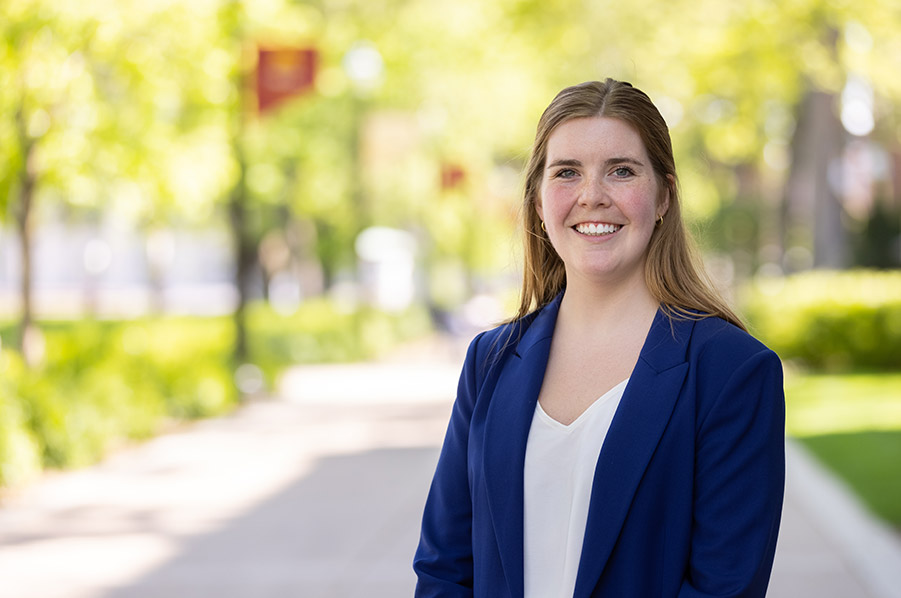Introduction
What most excites you about the SPH Strategic Plan for Antiracism?
“I’m most excited about all of the ways we are operationalizing the plan. I think it’s really easy in diversity and antiracism work to say that we’re going to educate people or that we’re going to talk about it, but it’s a whole other thing to have as many concrete steps that are in the SPH plan.
I also love that the student section of the plan clearly speaks to students. You can tell that it was a collaborative effort and wasn’t just created by somebody deciding what the students wanted.”
Commit
Using “commit” emphasizes a pledge to prioritize antiracist efforts in making SPH a more welcome, equitable, and just organization.
What do you see as your role in antiracism?
“As the president of the SPH Student Senate, I get to play a large role in the work of antiracism. I help decide what events to hold and how we recruit new people to the senate. In the recruitment process, we’re focusing on antiracism in the application process. Our executive board now gets paid a stipend, which will hopefully increase equity for all members. And we’re going to continue with our structural oppression seminar series.
In my professional life, I just finished an internship with People Serving People, the largest emergency housing shelter in Minnesota. Part of their strategic plan is racial equity and housing, and we would prioritize applying for grants that had an equity focus.
In my research, I’m interested in studying how laws and our criminal justice system negatively impact people, and predominantly people of color. I’m not quite sure where that will take me, but this topic was what drew me to public health.”
How are you committing on a daily basis (professionally and/or personally) to antiracism?
“I do a lot of little things every day that become routine and have a big impact over time in helping me be more inclusive and better able to understand racism. For example, I follow diverse people on social media, I read journal articles from diverse authors, and I frequent places owned by people of color, etc.”
Challenge
We are “challenged” to accept that racism exists and to “challenge” it when we see it.
What are some ideas you have about how to stand up to racism?
“As individuals, we can get comfortable with being uncomfortable. It’s never easy to call someone out for saying something inappropriate, having an unconscious bias, or using a microaggression. We need to challenge ourselves to communicate with people and help deepen their understanding of racism.”
How are you challenging yourself in antiracist work?
“I struggle with anxiety, and speaking up in meetings and groups doesn’t come easy to me. So the way I challenge myself is by intentionally stepping into leadership roles and then advocating for more equitable practices.”
Change
We have to be willing to “change” and shift our beliefs, attitudes, and actions toward equity and justice.
What is your vision for an antiracist school of public health?
“I chose SPH because I saw it as a place where I could learn and grow, but I also saw that the school was meeting the moment. Since starting last fall, I’ve seen the vision that I had going to graduate school come true, and I’ve also seen a lot of hard work from students, faculty, and staff on antiracism.
So in the next year, with the launch of this plan, I hope that SPH can not only be a top tier place for public health, but it could also be a top tier place for culture, environment, and antiracism that students carry beyond campus. In this way, we can create a ripple effect of not just changing how our culture is on campus, but having those people go out and do the work in the real world.”
What is the most important ingredient for culture change in our school and as a community?
“Willingness. Everyone at SPH — in order to get to where we want to be — needs to be willing to change, willing to have tough conversations, willing to acknowledge that they’re wrong, and willing to challenge people that they may be close with. We can’t reach our goals if people know what they’re supposed to do but they aren’t willing to try.”
“Building Equity, Driving Justice: Commit | Challenge | Change” — ties all communications related to the SPH Strategic Plan for Antiracism together under one look and feel. The theme showcases our guiding principles, and it motivates and inspires. "Agents for Change" profiles support this theme and all interview questions are related to the action words, Commit, Challenge, Change, as described above.
Submit an idea for this profile series — either your own story, or one that inspires you from another SPH individual or group.

